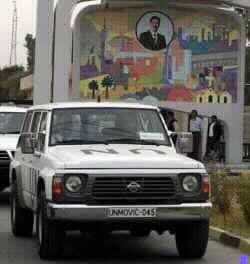U.N. experts inspected an animal vaccine production lab and an active munitions factory near Baghdad on Thursday, the second day of a hunt for suspected weapons of mass destruction in Iraq. The inspections proceeded mainly smoothly, just as they did Wednesday when the weapons inspectors resumed work in Iraq after a four-year gap. But taking no chances the inspectors ordered electronic debugging equipment to make sure the Iraqi authorities were not eavesdropping on their headquarters.
Russia expressed satisfaction at the "successful start" of the inspections and hailed the "mood of constructive cooperation" between Iraq and the United Nations experts.
An Iraqi military spokesman said U.S. and British planes patrolling a "no-fly" in northern Iraq bombed civilian targets in Nineveh province, killing one civilian. There was no immediate word from Washington or London on the report.
Western planes dropped leaflets on a previously attacked communications site in southern Iraq, warning Iraqis to stop repairing the facility, the U.S. military said.
The unmanned facilities between Al Kut and Al Basrah, in the southern no-fly zone, were attacked on Nov. 22. U.S. officials have repeatedly warned that continued firing by Iraqi defenses at U.S. and British jets patrolling the no-fly zones was a direct violation of the Nov. 8 U.N. resolution on Iraq's weapons of mass destruction.
The White House has stopped short of saying that shooting at the planes would be a trigger for war against Iraq or that Washington has any plans to lodge a formal complaint with the Security Council.
The United States has threatened a military assault on Iraq if President Saddam Hussein obstructed the arms inspections.
Iraq has denied possessing chemical, biological and nuclear weapons of mass destruction, a stance Washington has questioned.
Two teams of inspectors accompanied by Iraqi officials spent several hours in both facilities, talking to employees, checking equipment and taking samples.
DEFUNCT FACITLITY
A group of inspectors spent four hours at a foot and mouth vaccination laboratory in the Dora area south of Baghdad. The once government-run facility has been defunct since weapons inspectors dismantled its equipment in 1996. Another team spent little over three hours at Nasr (Victory) complex in the Taji area, some 16 miles north of the capital, where there are factories producing light conventional ammunition and heavy civilian machinery.
The two facilities had been mentioned by the United States in recent months as sites suspected of producing banned weapons.
At the Dora facility, the inspectors noticed that some equipment was missing, and were told by the Iraqis that it had been moved to another facility a month ago. When they demanded to see that facility, they were driven there by the Iraqi minders after they finished inspecting the Dora facility.
"They took them from Dora to Taji, where the IAEA team went, it's small equipment, simple equipment but it should not have left," said Dimitri Perricos, head of the U.N. Monitoring, Verification and Inspection Commission (UNMOVIC) team.
"If they move equipment to another facility they have an obligation to report that," Perricos added in a press briefing. "The important thing is that when we told them we want to follow up the equipment, they did not object."
Journalists in dozens of cars were involved in hot pursuit of the inspection teams. They followed the teams to the sites in high-speed car chases, but Iraqi guards again stopped them from entering the facilities.
No inspections are planned for Friday, the Muslim weekend.
The inspectors will get electronic equipment to make sure that their operations center in Baghdad has not been bugged during their four-year absence, U.N. sources said Thursday.
"There is no proof that there is anything there but after four years, who knows," the source said.
Bug sweepers will be brought in over the weekend.
The Iraqi state-run press was not impressed by the resumption of inspections. Newspapers gave little coverage to the inspectors' work, while blaming the United States for the failure of the previous inspection regime.
PHOTO CAPTION
U.N. weapons inspectors leave the Nasr (Victory) complex in the Taji area, some 25 km (16 miles) north of Baghdad on November 28, 2002. (Faleh Kheiber/Reuters)
- Author:
& News Agencies - Section:
WORLD HEADLINES


 Home
Home Discover Islam
Discover Islam Quran Recitations
Quran Recitations Lectures
Lectures
 Fatwa
Fatwa Articles
Articles Fiqh
Fiqh E-Books
E-Books Boys & Girls
Boys & Girls  Hajj Rulings
Hajj Rulings Hajj Fatwas
Hajj Fatwas














